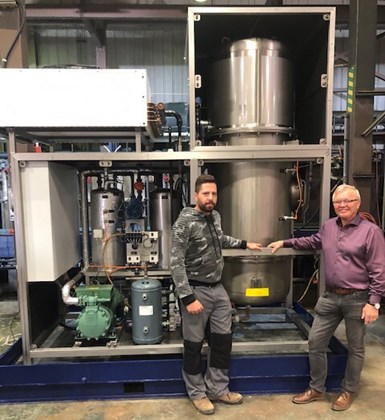Advanced Finishing Technologies Pilots Closed-Loop Vacuum Evaporation System
Custom-designed chrome reclamation system minimizes water and chemical consumption, and waste effluent.
Advanced Finishing Technologies (AFT) in Corunna, Ontario, installed a custom-designed chrome reclamation system in October 2019 that has minimized its water and chemical consumption, and waste effluent.

Andreas Dittman and Max Wiener with the custom-designed chrome reclamation system.
It’s a closed-loop, vacuum evaporation system based on units already in use in Europe. “Where everything is a little more stringent,” says Max Wiener, president/owner of RoboBuff Inc. in Port Huron, Michigan, and Advanced Finishing Technologies in Corunna, Ontario.
Wiener spent 18 months working with a German manufacturer to customize the unit’s design to handle his companies’ reclamation and filtration system needs. Wiener says the design was simplified and the unit constructed for less money than many comparable units. The goal was to translate the theoretical into something practical for production plating and metal finishing, and that could be used for numerous applications.
“While we didn’t invent the wheel with this, it was about bringing together multiple concepts and making them applicable to large-scale plating applications, all while being economical,” Wiener says. “We’ve redesigned it a little bit to create a complete closed loop system where we have no more waste from our chrome flashing operation. Since October, we haven’t made any chemical additions to our chrome line. Normally, we used to add every week.”
So far, AFT has cut chemical consumption by about 40% as it continues to collect data. “We want a bigger sample size,” says Max Andrew Wiener, Wiener’s son and president/owner of Auto Anodics Inc. “The goal is to run it longer term in full production, not some pilot. This is plugged right into our production line that’s been running for 20 years. Immediately, we saw major savings in terms of our chemical and water consumption, but, most importantly our effluent. The purity of the water is fantastic.”
The fundamentals of the science are a vacuum condenser, heat-exchanged separator system that allows distillation of concentrated chromic acid rinse water into reagent chromic acid and pure distilled water. “Our goal was to achieve a net zero-discharge environment,” Wiener says.
The process involves separating the water stream, distilling the water, taking the chrome back and putting it back into the system. “We’re just evaporating the chemicals from a diluted state into a concentrated state, put the chemicals back in and then put the clean water back in the process and we have no more waste from the chrome line,” Max Andrew Wiener says. “It cuts down on the chemical cost, it’s more efficient and no more waste.”
AFT also focused on designing a unit that minimizes maintenance and maximizes durability, using fewer moving parts, titanium construction and quick, easy access for routine cleaning and maintenance. “We wanted a system that’s robust, easy to maintain and operate, and designed for long-term operating efficiencies,” Wiener says.
The unit also has modular mobility. “It’s installed on a mobile, small footprint platform and designed to quickly connect/disconnect to a line, so it can be easily moved to other lines,” Wiener says.
AFT’s design can also be tailored to process-specific needs and is said to be easily scalable. “While my application intention was for the chrome industry, this design is not chemical- or process-line specific,” Wiener says. “It can be used for a wide range of plating lines. This system can be used for any waste recovery, wherever you have liquid waste.”
As AFT continues to gather data, it’s pleased with the results. “Simply, it works for production,” Wiener says. “The unit is economical to install and operate, and the savings are real.”
Visit advancedfinishingtechnologies
Related Content
Trivalent Chrome Overview
As the finishing industry begins to move away from the use of hexavalent chromium to trivalent chromium, what factors should finishers consider as they make new investments? Mark Schario, chief technology officer for Columbia Chemical offers a helpful overview of this complicated topic.
Read MoreProducts Finishing Reveals 2024 Qualifying Top Shops
PF reveals the qualifying shops in its annual Top Shops Benchmarking Survey — a program designed to offer shops insights into their overall performance in the industry.
Read MoreInnovation in Plating on Plastic
Plating on advanced plastics solution offers improved adhesion, temperature resistance and cost savings.
Read MoreSuccessful South African Plater Beating the Odds
Remaining focused on quality and reliability, Team Plating Works stays profitable in a volatile and challenging economy.
Read MoreRead Next
Delivering Increased Benefits to Greenhouse Films
Baystar's Borstar technology is helping customers deliver better, more reliable production methods to greenhouse agriculture.
Read MoreEducation Bringing Cleaning to Machining
Debuting new speakers and cleaning technology content during this half-day workshop co-located with IMTS 2024.
Read MoreEpisode 45: An Interview with Chandler Mancuso, MacDermid Envio Solutions
Chandler Mancuso, technical director with MacDermid Envio discusses updating your wastewater treatment system and implementing materials recycling solutions to increase efficiencies, control costs and reduce environmental impact.
Read More














.jpg;maxWidth=300;quality=90)











